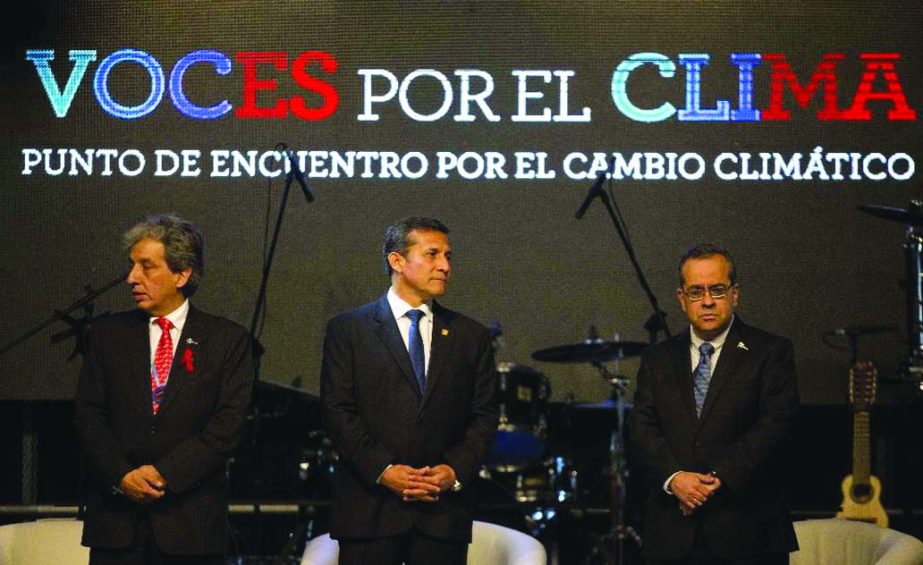
AP, LIMA, Peru :
With 2014 on track to become the warmest year on record and time running short, more than 190 nations began talks on a new worldwide deal to limit greenhouse gas emissions and keep global warming from causing irreversible damage.
New targets for fossil fuel use were announced ahead of the climate conference by the U.S., the European Union and China, the first Asian nation to make such a pledge. This has injected optimism into negotiations that are supposed to climax in Paris next year with the adoption of a long-awaited climate pact.
But India, Russia, Japan and Australia have yet to commit to new limits; and scientists say much sharper emissions cuts are needed in coming decades to keep global warming within 2 degrees C (3.6 F) of pre-industrial times, the overall goal of the U.N. talks. Global temperatures have already risen about 0.8 degrees C (1.3 F), and more heat-trapping gases are emitted every year.
Every degree of warming can cause long-lasting impacts, from melting ice caps and rising sea levels to the loss of species.
“Human influence on the climate system is clear,” Rajendra Pachauri, who leads the U.N.’s panel of climate-change experts, told delegates at the opening session in Lima on Monday.
To have a decent chance of reversing the warming trend before the planet hits the 2-degree mark, the world needs to slash emissions by 40 percent to 70 percent by 2050 and to near-zero by the end of the century, according to the panel’s assessments.
Scientists are practically united in warning that there’s no way to meet this goal by continuing business as usual.
It would require a sustained, permanent, worldwide shift from fossil fuels to renewable energy sources to power homes, cars and industries. And even then, the transition might not happen fast enough without a large-scale deployment of new technologies to remove greenhouse gases from the atmosphere.
“We call on the world to ensure the opportunity does not slip away,” said Nauru’s Marlene Moses, representing a group of Pacific island nations threatened by rising seas.
The biggest challenge for the U.N.-sponsored talks is dividing responsibilities between rich Western countries and emerging economies such as China and India.
With 2014 on track to become the warmest year on record and time running short, more than 190 nations began talks on a new worldwide deal to limit greenhouse gas emissions and keep global warming from causing irreversible damage.
New targets for fossil fuel use were announced ahead of the climate conference by the U.S., the European Union and China, the first Asian nation to make such a pledge. This has injected optimism into negotiations that are supposed to climax in Paris next year with the adoption of a long-awaited climate pact.
But India, Russia, Japan and Australia have yet to commit to new limits; and scientists say much sharper emissions cuts are needed in coming decades to keep global warming within 2 degrees C (3.6 F) of pre-industrial times, the overall goal of the U.N. talks. Global temperatures have already risen about 0.8 degrees C (1.3 F), and more heat-trapping gases are emitted every year.
Every degree of warming can cause long-lasting impacts, from melting ice caps and rising sea levels to the loss of species.
“Human influence on the climate system is clear,” Rajendra Pachauri, who leads the U.N.’s panel of climate-change experts, told delegates at the opening session in Lima on Monday.
To have a decent chance of reversing the warming trend before the planet hits the 2-degree mark, the world needs to slash emissions by 40 percent to 70 percent by 2050 and to near-zero by the end of the century, according to the panel’s assessments.
Scientists are practically united in warning that there’s no way to meet this goal by continuing business as usual.
It would require a sustained, permanent, worldwide shift from fossil fuels to renewable energy sources to power homes, cars and industries. And even then, the transition might not happen fast enough without a large-scale deployment of new technologies to remove greenhouse gases from the atmosphere.
“We call on the world to ensure the opportunity does not slip away,” said Nauru’s Marlene Moses, representing a group of Pacific island nations threatened by rising seas.
The biggest challenge for the U.N.-sponsored talks is dividing responsibilities between rich Western countries and emerging economies such as China and India.

